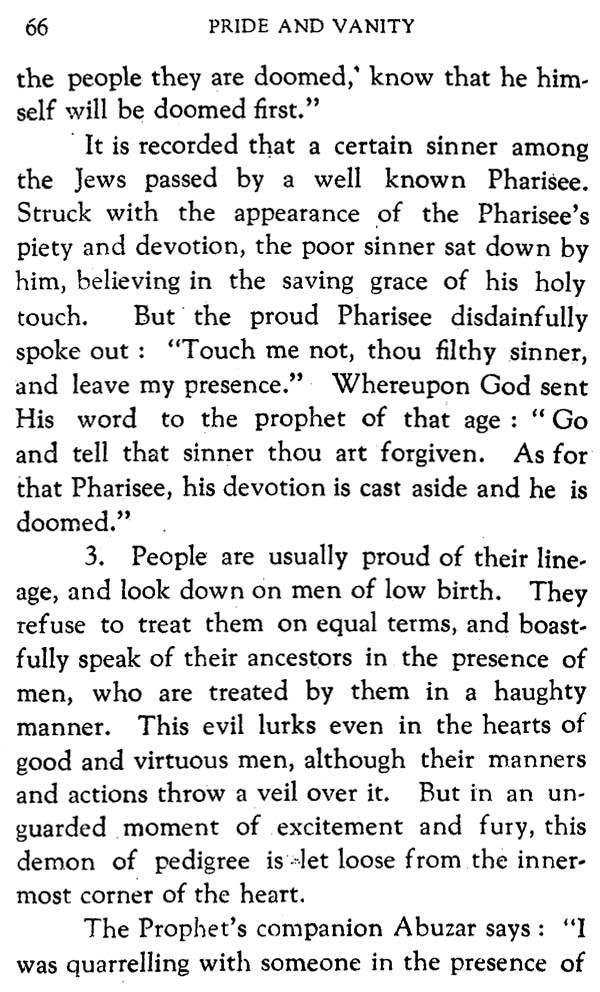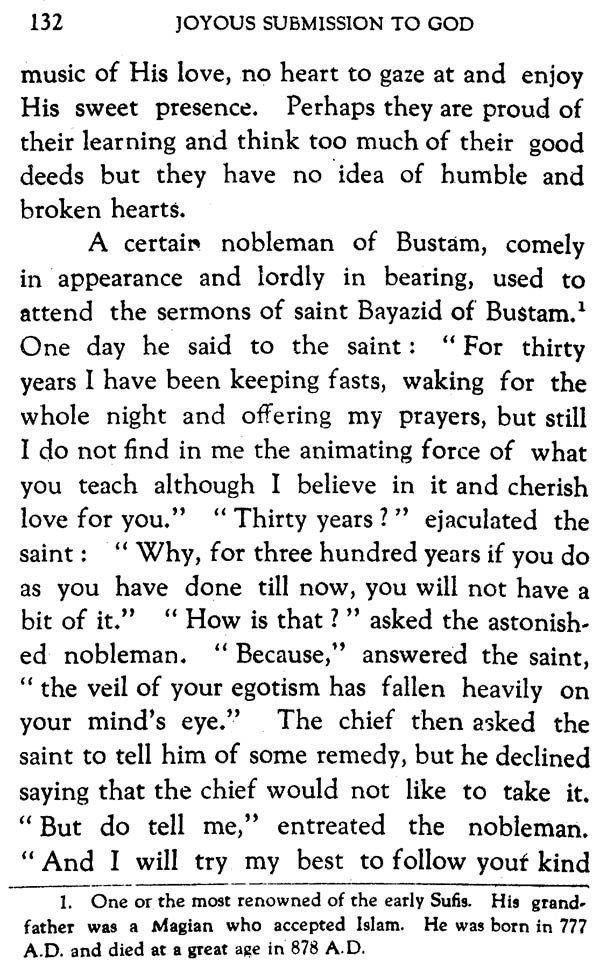
Some Moral and Religious Teaching of Al- Ghazzali
Book Specification
| Item Code: | NAJ449 |
| Author: | Syed Nawab Ali |
| Publisher: | KITAB BHAVAN |
| Language: | English |
| Edition: | 1994 |
| Pages: | 156 |
| Cover: | Hardcover |
| Other Details | 7.5 inch x 5.0 inch |
| Weight | 190 gm |
Book Description
At the request of Shaikh Muhammad Ashraf of Lahore who is doing good work by publishing works on Islamic Literature in English, I have revised and enlarged my book entitled" Some Religious and Moral Teachings of Al-Ghazzali " which was first published in 1920 by my colleague Alban G. Widgery, M.A., Professor of the Comparative Study of Religions at Baroda College. Below I give a short biographical sketch of Al-Ghazzali and at the end of the book an illuminating extract from his Minhajul-Abidin's Prologue under the heading, "The Seven Valleys." It is expected that the book in its present form will prove mo.re useful and instructive.
He received his education at Naishapur under Imam. ul-Haramain Juwaini who was a leader of the Asharite School of thought. During his studies he freely mixed with the leaders of the various sects in Islam and tried to grasp their respective view-points. This spirit of free inquiry and broadmindedness coupled with his great intellectual powers and genuine search after Truth made him one of the most original thinkers that Islam has produced. In A.H. 478 after the death of his teacher, he left Naishapur and went to the court of Nizarnul-Mulk the great vizier of the Saljuks who attached him to his retinue of theologians until A.H. 484 when he was appointed professor in the Nizamia College at Baghdad. For four years he taught and wrote Fiqh (Canon law) and also controversial books against the Batinias and other heretical sects. A critical study of Greek philosophy and its depressing effect on lman (Faith) dissatisfied him with intellectualism. Philosophy had now no charms theology as taught in those days appeared as a dead letter and all seemed blank to him. He would have taken refuge in Sufiism but he knew that true Sufiism was (ecstatic state of mind) and not J(.j (tall talk). A graphic account of this inward struggle is given by Al-Ghazzali himself in his Al Munqid min ad Dalal which he wrote five years before his death. At fast unable to bear the mental shock any more he put behind him his brilliant position and worldly honour and fled, so to say, from Baghdad in A.H.488. Then he made a pilgrimage to Mecca, visited Medina, Jerusalem and other holy places. Praying by the side of Abraham's tomb at Hebron he took a vow not to indulge in disputations, not to attend "Darbars ' and not to accept any stipend. The following anecdote will give an idea of how he was purifying his soul. In one of his wanderings while reading "books in running brooks and sermons in stones" he halted at a mosque where from the pulpit he heard the preacher saying, "So says our Imam Ghazzali." Said Gazzali to himself, n How pleasing is this remark to thee, 0 my conceited self, but I would not tolerate the enjoyment of the pleasure any more. Leave this place at once and go where nobody talks of thee." From such strugglings after Truth and purity of heart did Ghazzali win to a bright faith, a sure conviction and a power of leading others to that Sirat-e-Mustaqeem (the Straight Path) which was revealed in the Quran. He now felt it his sacred duty to bequeath to posterity what he had gained, not through speculative methods but by ecstatic experience. Political conditions of those times gave also a stimulus to his resolve. The march of the Crusaders from Christendom and the fall of Jerusalem in A.H. 492-where in the Great Mosque deplorable scenes which disgraced the conquest of Titus in 70 A.D; were renewed- was a national calamity. And the discord among the Muslim princes and the weakness of the Fatimite Khalif Mustaali in Egypt enabled the Franks to establish themselves in the countries of Islam. Ghazzali had to leave Palestine; he went to Egypt but soon returned from Alexandria.
During seven years of retreat in different places with periods of return to his family from time to time, he composed his great work Ihya Ulum-id-Din which immortalised his name and earned for him the illustrious title of Imam Hujjatul-Islam. In A.H. 499 he was forced by the Saljuk Sultan to teach in the Nizamia College at Naishapur, but he resigned after a short period and retured to his native place in Tus where he died in peace on the 14th of Jamadi-us-sani A.H. 505 (December 19, 1111).
In his Literary History of Persia, vol. I, p. 293, Browne has quoted Tholuck thus;-
"Ghazzali," says he, "if ever any man has deserved the name, was truly a divine, and he may justly be placed on a level which Origen, so remarkable was he for learning and ingenuity, and gifted with such a rare faculty for the skilful and worthy exposition of doctrines."
Ghazzali's influence on Eurpean thought, even the most modern, has been marked. In the Middle Ages it flowed through the pugio fidei of Ramon Marti, and affected first Thomas Aquinas and later Pascal.
The Comparative Study of Religion, interesting as a form of intellectual research, has for many a further value in the influence it may exert upon the widening and the deepening of the religious life. The practical value may become more and more acknowledged if, as signs suggest, the reality of the religious experience is more keenly felt and mankind recognise the place of religious goods in the highest type of life. Though it is certainly premature to say that there is much serious acknowledgment and recognition of these values amongst the peoples of the world, there are reasons to think that tendencies of thought and feeling in this direction are increasing in power. One of the best means of aiding the Comparative Study of Religions and promoting these tendencies is by the publication of important books connected with the religions, representing the views of leading thinkers and saints.
If we turn to Islam, we find that some Western writers describe it as in a condition of progressive decay, while others would have us believe that its onward march is a menace. It is well to be able to avoid the obvious purpose which lies behind both contentions. Nevertheless, to the present writer it appears true to say that there is much stagnation in Islam-(in which religion is there not?)-and that its spirit is often lost and its real teachings neglected owing to the general use of Arabic in the recitation of the Quran by persons entirely ignorant of that language, and also to the prevalent mechanical conception of the character of the Quran as a form of divine revelation. We believe that the Comparative Study of Religions will help to turn the attention of Muslims away from these to the emphasising of the essential spirit of Islam. This should be central and normative in the rising movements of reform and rejuvenescence. In this connection, as bringing out this spirit, it is especially appropriate, both for the students of the religions and for those directly interested in the spiritual revival in Islam, to publish in an easily accessible form some of the religious and moral teachings of Ghazzali. A Western scholar has written of him that he is (C the greatest, certainly the most sympathetic figure in the history of Islam the only teacher of the after generations ever put by Muslims on a level with the four great Imams." And he goes on to remark further: (C In the renaissance of Islam which is now rising to view, his time will come and the new life will proceed from a renewed study of his works." But Dieterici says of him: (C As a despairing sceptic he springs suicidally into the all-God (i.e. all- pervading deity of the Pantheists) to kill all scientific reflection." To justify such a judgment would indeed be impossible if the whole course of Ghazzali's works is taken into consideration. The greatest eulogy is perhaps that of Tholuck: “All that is good, worthy, and sub- lime, which his great soul had compassed, he bestowed upon Muhammedanism, and he adorned the doctrines of the Quran with so much piety and learning that in the form given them by him, they seem, in my opinion, worthy of the assent of Christians. Whatsoever was most excellent in the philosophy of Aristotle or in the Sufi mysticism, he discreetly adapted to the Muhammedan theology. From every school he sought the means of shedding light and honour upon religion, while his sincere .piety and lofty conscientiousness imparted to all his writings a sacred majesty.”
One feature of Ghazzali's attitude has considerable significance in looking to an increased study of his works as a factor towards the revivification of Islam: his tolerance. Although regarding Al Hallaj's expressions, (for example, I am the truth, i.e. God) as incautious, he helped to defend him and to save him from execution on a charge of blasphemy. He wrote a treatise on tolerance: The Criterion of the Difference between Islam and Heresy. In this teaching of tolerance he felt himself to be pointing back to the policy of the earliest Muslim times and to the greatest authorities of early Islam. He “strove to attract the souls of his fellow Muslims to spiritual faith which unifies, to worship at the altars which are in the hearts of men.”
| Preface | v |
| Introduction | 1 |
| List of Al-Ghazzali's Works | 18 |
| I. Extracts from "Ihya Ulum-Id-Din" | |
| The Nature of Man | 28 |
| Human Freedom and Responsibility | 37 |
| Pride and Vanity | 57 |
| Friendship and Sincerity | 71 |
| The Nature of Love, and Man's ;highest Happiness | 87 |
| The Unity of God | 104 |
| The Love of God and its Signs | 110 |
| Riza or Joyous Submission to His Will | 126 |
| II-Extracts From "Minhajul-Abidin" | |
| The Seven Valleys | 134 |
| Index | 141 |











